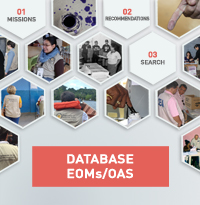- Español
- English
Electoral Participation in Central America
 This study about electoral participation in Central America is divided into three chapters. The first chapter revises the factors that may influence electoral participation and how it has evolved in Central America since the restoration of democracy. The second chapter presents empirical data about electoral participation in five Central American countries that took part in this study and facilitated information about their electoral registry: Costa Rica, El Salvador, Guatemala, Honduras and Panama. Socio-demographic indicators were taken into account when collecting the data. The information gathered from the electoral registries seeks to be an important contribution to the analysis of the socio-demographic factors that influence electoral participation. The third chapter presents recommendations that, in light of the analyzed data, could contribute to encourage electoral participation not only in the analyzed countries, but in the whole region.
This study about electoral participation in Central America is divided into three chapters. The first chapter revises the factors that may influence electoral participation and how it has evolved in Central America since the restoration of democracy. The second chapter presents empirical data about electoral participation in five Central American countries that took part in this study and facilitated information about their electoral registry: Costa Rica, El Salvador, Guatemala, Honduras and Panama. Socio-demographic indicators were taken into account when collecting the data. The information gathered from the electoral registries seeks to be an important contribution to the analysis of the socio-demographic factors that influence electoral participation. The third chapter presents recommendations that, in light of the analyzed data, could contribute to encourage electoral participation not only in the analyzed countries, but in the whole region.
 Access the full text here: (Available in Spanish)
Access the full text here: (Available in Spanish)
Elections in Latin America in 2013: retrospectives
 This publication presents an analysis of information gathered during three Electoral Observation Missions (EOMs) of the OAS in 2013 (Paraguay, Ecuador and Honduras) in order to contribute with substantive elements to the discussion about advances and pending challenges in the electoral processes of the region. The comparative analysis presented in this publication puts together the main conclusions of the methodologies that observe the participation of women in electoral processes and political financing systems, which were implemented during the EOMs. It also presents recommendations which seek to contribute to the strengthening of democratic institutions in the region.
This publication presents an analysis of information gathered during three Electoral Observation Missions (EOMs) of the OAS in 2013 (Paraguay, Ecuador and Honduras) in order to contribute with substantive elements to the discussion about advances and pending challenges in the electoral processes of the region. The comparative analysis presented in this publication puts together the main conclusions of the methodologies that observe the participation of women in electoral processes and political financing systems, which were implemented during the EOMs. It also presents recommendations which seek to contribute to the strengthening of democratic institutions in the region.
 Access the full text here: (Available in Spanish)
Access the full text here: (Available in Spanish)
The Financing of Political Parties in Latin America
 This study highlights and analyzes the main characteristics of political party and campaign financing in 18 Latin American countries. It outlines the main trends in campaign finance reform, the topics addressed in reforms that have already been implemented, and the areas that still have to be regulated and are being debated in each country.
This study highlights and analyzes the main characteristics of political party and campaign financing in 18 Latin American countries. It outlines the main trends in campaign finance reform, the topics addressed in reforms that have already been implemented, and the areas that still have to be regulated and are being debated in each country.
 Access the full text here: (Available in Spanish)
Access the full text here: (Available in Spanish)
Electoral Technology in the Americas: Five Case Studies
 This study compiles and presents information on the practices and experiences of applying technology to electoral administration. It examines the cases of five OAS Member States: Chile, Costa Rica, Jamaica, Mexico and Peru.
This study compiles and presents information on the practices and experiences of applying technology to electoral administration. It examines the cases of five OAS Member States: Chile, Costa Rica, Jamaica, Mexico and Peru.
Best Practices for OAS Electoral Observation, 2004-2007
 This study presents the elements that OAS Members States and the international community have identified as essential for the successful organization of Electoral Observation Missions. Best practices include the development of specialized methodologies, the incorporation of a gender perspective into the work of observation missions, and the establishment of standardized criteria to select members for OAS/EOMs, amongst others.
This study presents the elements that OAS Members States and the international community have identified as essential for the successful organization of Electoral Observation Missions. Best practices include the development of specialized methodologies, the incorporation of a gender perspective into the work of observation missions, and the establishment of standardized criteria to select members for OAS/EOMs, amongst others.
 Access the full text here: (available in Spanish)
Access the full text here: (available in Spanish)
The 2007- 2012 Electoral Cycle in the Americas
 This study compiles and organizes information on the 17 electoral processes the OAS observed between 2007 and 2012. It also analyzes the practices, methodologies and progress done in the field of electoral observation and identifies areas for improvement. It examines the strengths and weaknesses of several systems and electoral processes in the region to reflect upon how the OAS can deepen and strengthen its contribution to these systems.
This study compiles and organizes information on the 17 electoral processes the OAS observed between 2007 and 2012. It also analyzes the practices, methodologies and progress done in the field of electoral observation and identifies areas for improvement. It examines the strengths and weaknesses of several systems and electoral processes in the region to reflect upon how the OAS can deepen and strengthen its contribution to these systems.
 Access the full text here:
Access the full text here:
Toolbox of norms and practices to strengthen the capacity of electoral authorities to regulate political financing with a gender perspective
This tool is both a practical and theoretical instrument that outlines norms and practices that can strengthen the technical capacity of electoral institutions to incorporate a gender perspective into their oversight of political-electoral financing. This effectively helps to guarantee conditions of gender equality and transparency in the race for political office.
Department of Electoral Cooperation and Observation
1889 F St., N.W.Washington, D.C., 20006
E-mail: deco@oas.org
Phone: (202) 370-4526
Fax: (202) 458-6250




